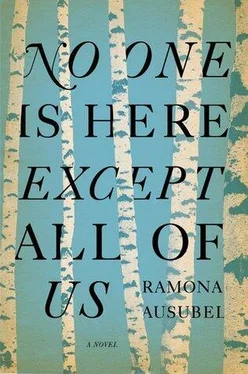“You are the house where I had my babies,” I said at my own rotted door. When I pulled it open I was flooded by water. Free now, the water spread wide. I walked through the slush of the house, which was empty. No pots remained in the kitchen. No pillows remained on the beds. No books. No spoons. No people. “No one is here?” I asked the soggy house. No table, no rocking chair, no poker to stir the coals in the fire. Someone had moved us out. The water had made boats of the few items left inside: one broken chair floated, one wooden bowl floated. My sons’ mattress remained, draped like a dead animal over the sink. It was green with mold.
Water had driven in and my house had dutifully held it. Fill it with rugs and chairs, fill it with children and baking bread, fill it with cabbage. Fill it with all the water in the world.
My walls were a crawl of mold, turned bright green, eaten down by moss. “How long has it been like this?” I asked the ghosts I could not see. “When did you go?”
If the ghosts tried to answer, their mouths were useless. I wished they would try to rustle my clothes, cool my skin or warm it, put their hands in my hair. Did they want to tell me they waited as long as they could? That they had taken care of my mothers and fathers and grandparents and siblings? Had they tried to remember me even after I left? They were empty wind by then. They were sucking mud at my feet. They were flaking bark on the trunks of fallen-down trees. Crushed rocks, clods of dirt, dried water, blown air.
At the first house I was raised in I stood in front of the door. I remembered the night I had tried to come home, and, of all the huge and complicated things that might have stood in my way, what had kept me out was a simple lock. I could not bear that again, so I left the big blue door out of it. I hung my clothes on the branches of an apple tree ravenous with white blossoms and climbed through the window where the water was ankle-deep and muddy. The smell was rich and dark. “No one is here? Was I right to leave when I did? Is anyone alive?” I called. My voice echoed off the water. I felt as if I were in an ancient cave.
I waded to the counter where I had watched my first mother chop cabbages every day for the first eleven years of my life. I splashed to the far wall where the fireplace was a dark pit, then to the place where my first mother and my first father had slept, had made me, had made my sister and brother. This was the first time I had been in the house since I was traded away. I scoured the bottom for cabbages but found none, dragging up handfuls of mud. I pulled up a marble and a soaked handkerchief. I wiped my face on the cloth, which only left me dirtier.
The second house I was raised in had fallen to one side and lost one of its walls. It held no pond inside — it was an empty skeleton. “No one is here?” I called, my skin cold but dried now by my clothes, my hair still dripping. “No one at all is anywhere? Anywhere here?” None of Kayla and Hersh’s beautiful things were displayed on the mantel. No soft Persian rugs were at my feet. The story of their lives was silent. I wanted to say something for them, some prayer, but I realized I hardly knew them. Bless Kayla and her desires. Bless Hersh and his attempts to fill them. May someone somewhere adopt you both.
I went into houses I had never entered before. Everything had sunk into softened ground. All the windows were too low, some of the doors buried enough to be sealed shut.
The barber’s was tiny and dark, all four walls tipped toward each other, a single pair of scissors, shining as if just polished, hanging from a nail on the wall. To the people who had lived there, no place would have mattered more.
Outside, the square was more beautiful than I remembered. Even destroyed, the windows had careful scrolls framing them, the roofs were pointed and red tiled, the doorways arched. The greengrocer’s was painted yellow, the butcher’s was pale blue, the jeweler’s little sliver of a shop was pink with white trim. This place was new to me, and yet completely familiar. It was as if I, a girl, were meeting myself as an old woman. The same body, the same place. Except.
The widow’s house was a graveyard of jars. I kicked them around so that something in the world would talk to me. They clattered but made no sense. Yet something revealed itself: I saw a small piece of yellow paper lying on the ground with a tack stuck in it. The ink had run, but I could still read the words. Dear Ones, We did not know what to do but hide when the soldiers arrived. There was a lot of shouting, then running toward the river and gunshots, then quiet. We waited for weeks, but none of you came home. We will not forget to include you in our story, which in spite of everything has a happy ending: we have been swept up by handsome Russian giants. If anyone is alive, write to us in Krasnograd. Love, Regina and Zelda . And there it was: my sister was saved. It was almost as good as being saved myself — my shadow had made it. Good news tasted like food to me. I folded the letter up and held it tightly. What else would I find? I said, “Thank you,” out loud to the roomful of jars, listening to me like a hundred ears.
The barn, I discovered, was where all our belongings had gone. I had to jump from desk to dresser to table to saddle horse. The room was a swimming pool stacked with towers of belongings. It smelled like mold and rotting wood and urine. I looked up and saw, complete but for one shattered bullet wound, the summer sky. Around me toys, mittens, boots and chair legs floated. Stacks of dish towels, hammers, worn wool coats, boxes of rusted jewelry, and rolling pins would have to wait a long time for this town to come alive, to need tools again. The piano, which had arrived along with our stranger, washed up on the shores of the old world, did not stand upright — it kneeled with its broken smile in the water.
I looked for but did not find a body to carry out and put in the ground. I did find the bones of some chickens, gathered nicely in the highest shelf of empty nests. I imagined them, wings folded, waiting to be saved.
Standing on the pedestal that used to live in the square and had been host to the long-dead war hero, now missing, I reached up and dragged my hand along the constellated wall. “Solomon would have known your name,” I said to the stars. One white tile was loose so I pulled it off and put it into my small bag. “This is the Solomon star,” I said. “Whatever it was called before, now it’s called Solomon.” I had nothing, and since I did not know what I needed, I decided to take whatever was being offered.
At the top of a stack of books I found the soft underfeathers of chickens and geese, gathered in an old sack. They even smelled soft. I tied a knot at the top of the sack and put it into my bag.
And there was one more thing tacked to a floating island of wood. It was a letter, and the letter was addressed to Lena, My Wife, Zalischik .
“Do not joke with me,” I said to the room and I listened for its reply. “Is this another letter for me?” The room echoed and dropped water down. I took the letter with my name on it. On the back was written: Igor, Jail, Sardinia, Italy. Inside, one piece of paper.
Dear L,
I am alive, did you know? I am getting to be a very, very fast swimmer. I can swim from the big rock all the way to the sandy beach in a matter of seconds. I learned how to make lasagna. Do you know what that is? My friend Francesco taught it to me, actually his mother did. How are my sons? Are you alive? What is the weather like where you are? Remember the time we climbed to the top of the apple tree and fell asleep in the branches? I hope you are alive.
Love, I
Читать дальше












